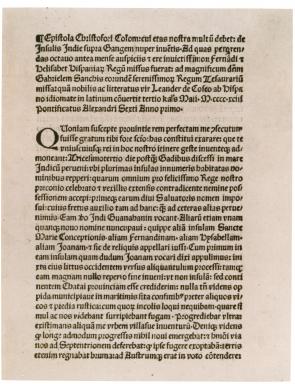Columbus reports on his first voyage, 1493
A Spotlight on a Primary Source by Christopher Columbus
On August 3, 1492, Columbus set sail from Spain to find an all-water route to Asia. On October 12, more than two months later, Columbus landed on an island in the Bahamas that he called San Salvador; the natives called it Guanahani.
For nearly five months, Columbus explored the Caribbean, particularly the islands of Juana (Cuba) and Hispaniola (Santo Domingo), before returning to Spain. He left thirty-nine men to build a settlement called La Navidad in present-day Haiti. He also kidnapped several Native Americans (between ten and twenty-five) to take back to Spain—only eight survived. Columbus brought back small amounts of gold as well as native birds and plants to show the richness of the continent he believed to be Asia.
When Columbus arrived back in Spain on March 15, 1493, he immediately wrote a letter announcing his discoveries to King Ferdinand and Queen Isabella, who had helped finance his trip. The letter was written in Spanish and sent to Rome, where it was printed in Latin by Stephan Plannck. Plannck mistakenly left Queen Isabella’s name out of the pamphlet’s introduction but quickly realized his error and reprinted the pamphlet a few days later. The copy shown here is the second, corrected edition of the pamphlet.
The Latin printing of this letter announced the existence of the American continent throughout Europe. “I discovered many islands inhabited by numerous people. I took possession of all of them for our most fortunate King by making public proclamation and unfurling his standard, no one making any resistance,” Columbus wrote.
In addition to announcing his momentous discovery, Columbus’s letter also provides observations of the native people’s culture and lack of weapons, noting that “they are destitute of arms, which are entirely unknown to them, and for which they are not adapted; not on account of any bodily deformity, for they are well made, but because they are timid and full of terror.” Writing that the natives are “fearful and timid . . . guileless and honest,” Columbus declares that the land could easily be conquered by Spain, and the natives “might become Christians and inclined to love our King and Queen and Princes and all the people of Spain.”
An English translation of this document is available.
Excerpt
I have determined to write you this letter to inform you of everything that has been done and discovered in this voyage of mine.
On the thirty-third day after leaving Cadiz I came into the Indian Sea, where I discovered many islands inhabited by numerous people. I took possession of all of them for our most fortunate King by making public proclamation and unfurling his standard, no one making any resistance. The island called Juana, as well as the others in its neighborhood, is exceedingly fertile. It has numerous harbors on all sides, very safe and wide, above comparison with any I have ever seen. Through it flow many very broad and health-giving rivers; and there are in it numerous very lofty mountains. All these island are very beautiful, and of quite different shapes; easy to be traversed, and full of the greatest variety of trees reaching to the stars. . . .
In the island, which I have said before was called Hispana, there are very lofty and beautiful mountains, great farms, groves and fields, most fertile both for cultivation and for pasturage, and well adapted for constructing buildings. The convenience of the harbors in this island, and the excellence of the rivers, in volume and salubrity, surpass human belief, unless on should see them. In it the trees, pasture-lands and fruits different much from those of Juana. Besides, this Hispana abounds in various kinds of species, gold and metals. The inhabitants . . . are all, as I said before, unprovided with any sort of iron, and they are destitute of arms, which are entirely unknown to them, and for which they are not adapted; not on account of any bodily deformity, for they are well made, but because they are timid and full of terror. . . . But when they see that they are safe, and all fear is banished, they are very guileless and honest, and very liberal of all they have. No one refuses the asker anything that he possesses; on the contrary they themselves invite us to ask for it. They manifest the greatest affection towards all of us, exchanging valuable things for trifles, content with the very least thing or nothing at all. . . . I gave them many beautiful and pleasing things, which I had brought with me, for no return whatever, in order to win their affection, and that they might become Christians and inclined to love our King and Queen and Princes and all the people of Spain; and that they might be eager to search for and gather and give to us what they abound in and we greatly need.

